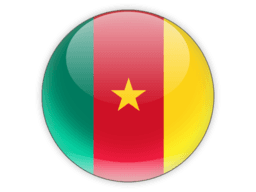
Regions of Cameroon
Explore 10 regions
Cities of Cameroon
Discover 50 cities across 10 regions
Adamaoua(5)
Littoral(7)
North-West(6)
South-West(7)
Cameroon is a country located in Central Africa, bordered by Nigeria to the west, Chad to the northeast, the Central African Republic to the east, Gabon to the south, and Equatorial Guinea to the southwest. The capital and largest city is Yaoundé, and the official languages are English and French.
Cameroon's economy is diversified, with significant resources in agriculture, oil and gas, and minerals. The country is one of the world's largest producers of cocoa, and also produces coffee, bananas, cotton, and palm oil. The oil and gas sector is a significant source of revenue for the country, as are minerals such as bauxite and iron ore. Cameroon has experienced economic growth in recent years, but poverty and inequality remain significant challenges.
Cameroon has a rich cultural heritage, with more than 250 ethnic groups and a variety of traditional music, dance, and art forms. The country is known for its traditional masks and carvings, and for its vibrant music scene, which includes genres such as bikutsi and makossa.
Cameroon is a presidential republic, with the president serving as both the head of state and government. The country has a multi-party system, but the political climate is often characterized by authoritarianism and human rights abuses. Cameroon has a free press and a vibrant civil society, but freedom of expression and association are often restricted.
Cameroon faces many challenges, including poverty, corruption, and a lack of access to education and healthcare. The country is committed to addressing these issues, with a focus on promoting economic growth, expanding access to education and healthcare, and improving governance and human rights. Cameroon is also working to address security challenges in the country's Anglophone regions, which have been plagued by violence in recent years.
National holiday
State Unification Day (National Day), 20 May (1972)
Telephone Code
237
Local Emergency Phone
Local numbers only
Vaccinations
An International Certificate of Vaccination for yellow fever is required for all travelers. See WHO recommendations. On 21 March 2022, the US Centers for Disease Control and Prevention (CDC) issued a Travel Alert for polio in Africa; Cameroon is currently considered a high risk to travelers for polio; the CDC recommends that before any international travel, anyone unvaccinated, incompletely vaccinated, or with an unknown polio vaccination status should complete the routine polio vaccine series; before travel to any high-risk destination, CDC recommends that adults who previously completed the full, routine polio vaccine series receive a single, lifetime booster dose of polio vaccine.
Climate
Varies with terrain, from tropical along coast to semiarid and hot in north
Currency (Code)
Cooperation Financiere en Afrique Central francs (Central African CFA franc, XAF)
Electricity/Voltage/Plug Type(s)
220 V / 50 Hz / plug types(s): C, E
Major Languages
24 major African language groups, English, French
Major Religions
Roman Catholic 38.3%, Protestant 25.5%, other Christian 6.9%, Muslim 24.4%, animist 2.2%
Potable Water
Opt for bottled water
International Driving Permit
Suggested
Road Driving Side
Right
Tourist Destinations
Yaounde; Limbe; Douala; Waza National Park; Bamenda; Foumban Palace; Lake Nyos
Major Sports
Soccer, tennis, boxing, basketball, cycling
Cultural Practices
Government officials are regularly referred to as "excellency" instead of by surname.
Tipping Guidelines
Tipping $2-5 (USD) per service rendered is considered acceptable for porters and waiters; $8-15 (USD) per person per day is considered normal for guides and safari drivers.
Souvenirs
Pottery, carved wooden tribal masks and animal sculptures, native beadwork dresses, woven mats and rugs, jewelry, tree sap paintings, spices
Traditional Cuisine
Ndolé — stewed nuts, ndoleh (bitter leaves), and fish, beef, or shrimp traditionally eaten with plantains or bobolo (fermented ground manioc or cassava wrapped in leaves)
Geography
Area
total: 475,440 sq km
land: 472,710 sq km
water: 2,730 sq km
Climate
varies with terrain, from tropical along coast to semiarid and hot in north
Natural resources
petroleum, bauxite, iron ore, timber, hydropower
People and Society
Population
30,135,732 (2023 est.)
Ethnic groups
Bamileke-Bamu 24.3%, Beti/Bassa, Mbam 21.6%, Biu-Mandara 14.6%, Arab-Choa/Hausa/Kanuri 11%, Adamawa-Ubangi, 9.8%, Grassfields 7.7%, Kako, Meka/Pygmy 3.3%, Cotier/Ngoe/Oroko 2.7%, Southwestern Bantu 0.7%, foreign/other ethnic group 4.5% (2018 est.)
Languages
24 major African language groups, English (official), French (official)
Religions
Roman Catholic 38.3%, Protestant 25.5%, other Christian 6.9%, Muslim 24.4%, animist 2.2%, other 0.5%, none 2.2% (2018 est.)
Population growth rate
2.73% (2023 est.)
Government
Government type
presidential republic
Capital
name: Yaounde
Economy
Economic overview
largest CEMAC economy with many natural resources; recent political instability and terrorism reducing economic output; systemic corruption; poor property rights enforcement; increasing poverty in northern regions
Real GDP (purchasing power parity)
$100.648 billion (2021 est.)
Real GDP per capita
$3,700 (2021 est.)
Agricultural products
cassava, plantains, maize, oil palm fruit, taro, sugar cane, sorghum, tomatoes, bananas, vegetables
Industries
petroleum production and refining, aluminum production, food processing, light consumer goods, textiles, lumber, ship repair
Exports
$7.449 billion (2021 est.)
Exports - partners
China 17%, Netherlands 14%, Italy 9%, United Arab Emirates 8%, India 7%, United States 6%, Belgium 6%, Spain 5%, France 5% (2019)
Exports - commodities
crude petroleum, cocoa beans, lumber, gold, natural gas, bananas (2019)
Imports
$9.027 billion (2021 est.)
Imports - partners
China 28%, Nigeria 15%, France 9%, Belgium 6% (2019)
Imports - commodities
crude petroleum, scrap vessels, rice, special purpose ships, packaged medicines (2019)
International Airports in Cameroon
Discover 5 major airports serving Cameroon
Mark Cameroon as Visited
Add Cameroon to your personal travel map and track your journey around the world. Share your adventures and see your progress grow!